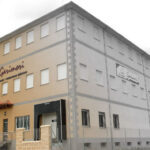The salting process is a fundamental step in the production of Iberian products, which plays a crucial role in the preservation and development of the characteristic flavour of these gastronomic treasures. This artisanal procedure has been perfected over the centuries, combining tradition and know-how to guarantee the highest quality.
Salting begins after the Iberian pig is slaughtered, when the selected pieces, such as the Iberian ham, shoulder and other cuts, are completely covered with sea salt. This step is essential to dehydrate the meat and create a hostile environment for micro-organisms that could spoil it. The duration of this stage depends on the size of the piece, normally one day for each kilo of weight.
One of the most important aspects of the process is the precise control of temperature and humidity. During the salting of the Iberian products, the pieces are kept in cold chambers, with temperatures ranging from 0°C to 5°C and controlled relative humidity. This environment ensures that the salt penetrates uniformly, contributing to a homogeneous and balanced curing process.
Salt not only acts as a natural preservative, but also has a direct influence on the final flavour of the Iberian product. After the necessary time in salt, the pieces undergo a washing process to remove excess surface salt and are left to rest in cool chambers. This post-salting period allows the residual salt to be evenly distributed, enhancing the flavour and aiding maturation.
The combination of traditional techniques and modern technology in the salting process reflects the commitment to excellence in the production of Iberian products. This essential step not only ensures food safety, but also contributes to preserving the heritage and authenticity of a product that is unique in the world.
In short, the salting process is an art that balances science and tradition, ensuring that each piece of Iberian ham and other products derived from the Iberian pig reach their maximum expression in flavour, aroma and texture.





